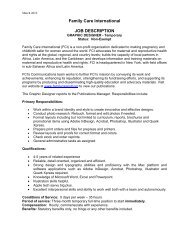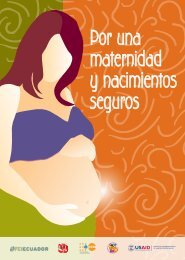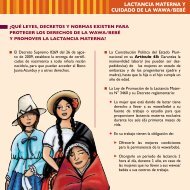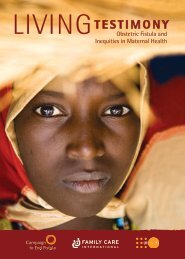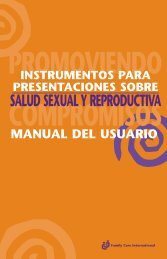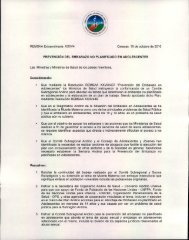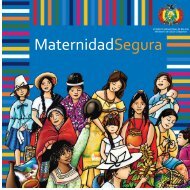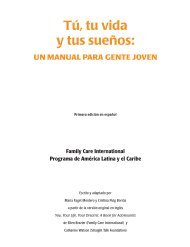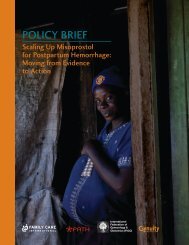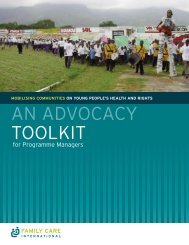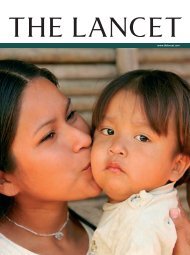Safe Motherhood: A Review - Family Care International
Safe Motherhood: A Review - Family Care International
Safe Motherhood: A Review - Family Care International
Create successful ePaper yourself
Turn your PDF publications into a flip-book with our unique Google optimized e-Paper software.
Bolivia<br />
2002–2007. During this period, the Universal<br />
Maternal/Child Health Insurance Law (Seguro<br />
Materno Infantil or SUMI) was implemented,<br />
as well as a range of processes within the<br />
broader context of decentralization, including:<br />
• strengthening the decisionmaking power of<br />
primary health care networks;<br />
• building bridges between health care<br />
providers and social networks;<br />
• improving the clinical and communication<br />
skills of providers at the health<br />
care level; and<br />
• promoting community mobilization<br />
strategies and individual, family, and<br />
community empowerment schemes.<br />
During this period, policies focused on the<br />
need to address obstetric emergencies<br />
and incorporate evidence-based clinical<br />
protocols—by improving the referral system,<br />
strengthening transport and communication<br />
networks, and developing strategies to<br />
promote community mobilization and<br />
advocacy in response to gaps in service. Also,<br />
the National Government adopted a set of<br />
goals including: reducing maternal mortality<br />
by 40% by 2008 and 75% by 2015 (based<br />
on 1990 levels); reducing infant mortality<br />
by 10% by 2008 in relation to the ENDSA<br />
2003 (National Survey on Demographics and<br />
Health); and increasing the number of births<br />
assisted by skilled attendants by 24%.<br />
<strong>Family</strong> planning has been an implicit and<br />
explicit component of national policies,<br />
especially in the 1998–2003 National Program<br />
for Sexual and Reproductive Health, and in<br />
the current 2004–2008 program, which adopts<br />
a strong rights-based approach. Ministry of<br />
Health efforts have focused on strengthening<br />
the availability of contraceptives; the<br />
introduction of Depo Provera has been a key<br />
factor in increasing contraceptive coverage.<br />
According to the 2003 ENDSA survey, in<br />
the last five years modern contraceptive<br />
method use among women in union has<br />
increased from 25.2 to 34.9%. For the first<br />
time, the increase in rural areas (from 11.3<br />
to 25.0%) was higher than the increase in<br />
urban areas, due in large part to an increase<br />
in use of Depo Provera. The Ministry of<br />
Health considers that the higher contraceptive<br />
prevalence rates, resulting from the increase<br />
in availability of services and of modern<br />
methods, have helped result in a decrease in<br />
maternal deaths in Bolivia.<br />
Programmatic Priorities<br />
Technical shifts in programmatic<br />
approaches and priorities reflect the<br />
changes occurring at the international and<br />
regional levels: a shift from the risk approach<br />
to evidence-based practice; from training<br />
traditional birth attendants to promoting<br />
the use of skilled attendants and of the<br />
care they provide; from an emphasis on<br />
the mother and child to a more integrated<br />
approach that focuses on sexual and<br />
reproductive health more broadly. For<br />
example, since 1983, the risk approach was<br />
developed and implemented as a longterm<br />
strategy, staunchly supported by the<br />
Ministry of Health. From 1983 until 1994,<br />
other program strategies were put forward<br />
to complement the risk approach, including<br />
the promotion of prenatal and delivery care,<br />
and care during the postpartum period.<br />
Although the risk approach has not been<br />
completely abandoned, it became outdated<br />
with the enactment of Resolution 0496,



